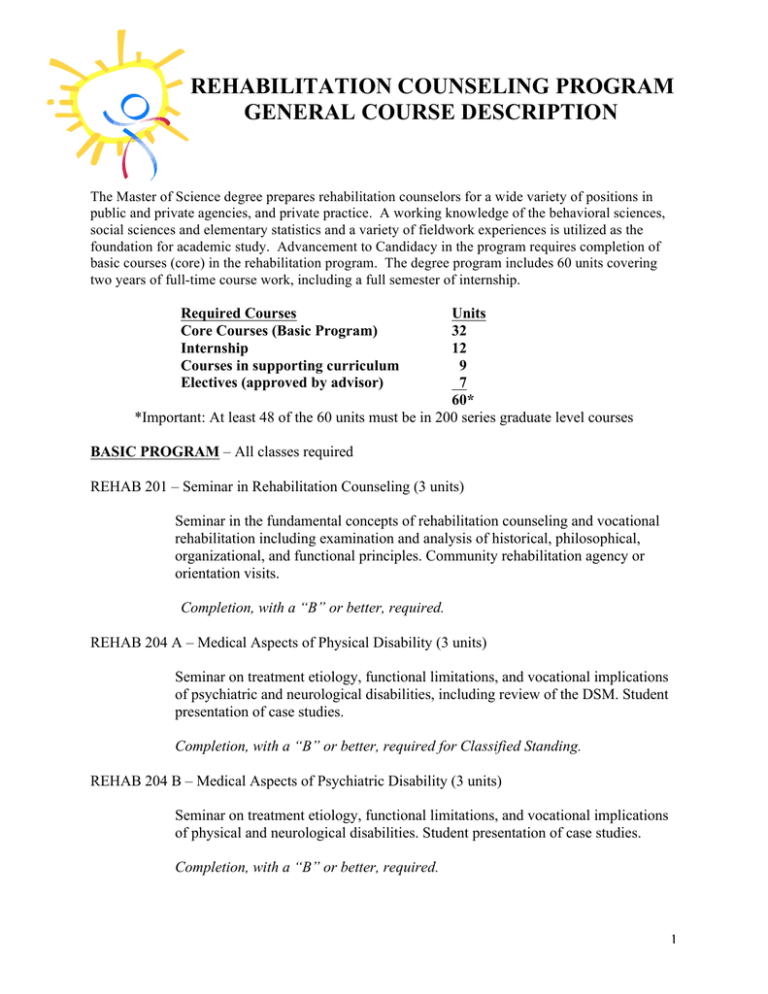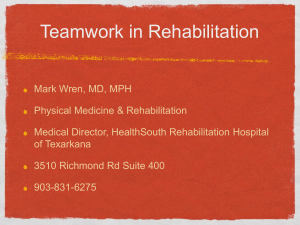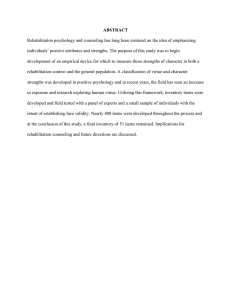
REHABILITATION COUNSELING PROGRAM
GENERAL COURSE DESCRIPTION
The Master of Science degree prepares rehabilitation counselors for a wide variety of positions in
public and private agencies, and private practice. A working knowledge of the behavioral sciences,
social sciences and elementary statistics and a variety of fieldwork experiences is utilized as the
foundation for academic study. Advancement to Candidacy in the program requires completion of
basic courses (core) in the rehabilitation program. The degree program includes 60 units covering
two years of full-time course work, including a full semester of internship.
Required Courses
Core Courses (Basic Program)
Internship
Courses in supporting curriculum
Electives (approved by advisor)
Units
32
12
9
7
60*
*Important: At least 48 of the 60 units must be in 200 series graduate level courses
BASIC PROGRAM – All classes required
REHAB 201 – Seminar in Rehabilitation Counseling (3 units)
Seminar in the fundamental concepts of rehabilitation counseling and vocational
rehabilitation including examination and analysis of historical, philosophical,
organizational, and functional principles. Community rehabilitation agency or
orientation visits.
Completion, with a “B” or better, required.
REHAB 204 A – Medical Aspects of Physical Disability (3 units)
Seminar on treatment etiology, functional limitations, and vocational implications
of psychiatric and neurological disabilities, including review of the DSM. Student
presentation of case studies.
Completion, with a “B” or better, required for Classified Standing.
REHAB 204 B – Medical Aspects of Psychiatric Disability (3 units)
Seminar on treatment etiology, functional limitations, and vocational implications
of physical and neurological disabilities. Student presentation of case studies.
Completion, with a “B” or better, required.
1
REHAB 205 – Career Placement in the Rehabilitation Process (3 units)
A seminar concerning the attitudes, skills, and abilities necessary to provide
effective vocational and career placement services to people with disabilities,
including vocational diagnosis, career development, placement techniques, job
analysis, affirmative action, and appropriate legislation.
REHAB 206 – Psychological and Social Aspects of Disability (3 units)
Seminar in psychological and sociological effects of physical and mental disability
and the dynamics of adjusting to disabling conditions. Student presentation of case
studies.
REHAB 237 – Case Practices in Rehabilitation Counseling (4 units)
Seminar in methods for facilitating client rehabilitation including interviewing,
case recording, plan development, ethical practices; field placement in a
community rehabilitation agency.
Completion with a “B” or better required.
REHAB 238 – Rehabilitation Counseling Practicum (4 units, max 8)
Laboratory rehabilitation counseling experiences with clients who are disabled,
supervised individual counseling sessions, analysis of the effects of disability on
personal and vocational development, methods of facilitating vocational
rehabilitation, observations, critiques, report writing. Students must carry
professional liability insurance.
REHAB 211 – Current Professional Issues in Rehabilitation Counseling (3 units)
Seminar on current professional issues in the field of rehabilitation counseling and
vocational rehabilitation programs in the public and private sectors with emphasis
on ethical standards, legal concepts, and professional development responsibilities.
REHAB 203 – Work Evaluation Procedures (3 units)
Study of systems and procedures of work evaluation and assessment by public and
private rehabilitation agencies to assess culturally diverse persons with disabilities.
Includes principles of testing; test selection (situational assessments and work
samples), administration, interpretation, and report generation.
REHAB 268A, 268B, 268C, 268D - Advanced Job Placement (3 units each)
Supervised practical application of case management and job development,
placement, retention, and advancement principles. Students work holistically with
welfare department referrals to develop and implement individualized service
plans with primary emphasis on vocational goals. Liability insurance required.
2
REHAB 239 – Internship in Rehabilitation Counseling (12 units)
Full-time, supervised field placement in one of a variety of settings including case
responsibilities. CR/NC grading only*
COURSES IN SUPPORTING CURRICULUM – Required Courses
COUN 200 – Seminar in Counseling Techniques (3 units)
Emphasis given to interviewing skills, philosophy, theory, and methodology as
applied to counseling. Students must earn a B or better to move on to COUN 208.
Prerequisite: COUN 174
COUN 202 - Seminar in Group Counseling (3 units)
Theories and methods of interpersonal communication within groups, transferal of
information, group leadership and membership, role perceptions, verbal and
nonverbal interaction, and group counseling.
Prerequisite: COUN 174 and COUN 200
ERA 220 – Research in Education (3 units)
Seminar in research methodology; identification of educational research problems;
use of library resources, data gathering and processing, writing a research report;
applies to elementary and secondary teaching, early childhood, reading
administration, counseling, special education, and related fields.
Prerequisites: 12 units of educational courses or equivalent and ERA 153
PREFERRED ELECTIVES – Select 7 units from the following or other courses approved by
your advisor.
REHAB 265 – Rehabilitation of Substance Abusers (3 units)
Introductory seminar in substance abuse covering patterns and extent of substance
abuse, models of addiction, assessment and diagnosis, legal ramifications,
physiological effects, drug characteristics, treatment approaches, prevention, and
ethical issues. Includes readings, lectures, guest presentations, class discussions,
and student activities.
REHAB 290 – Independent Study (1-3 units, max 6)
3
Student initiated study, under faculty supervision, to pursue a particular topic
offered in a course in more depth or to explore a new area of interest not touched
on in a regular class. Format may include original or library research submitted in
the form of a paper or an activity which includes submission of a paper
summarizing and critiquing the experience.
COUN 201 – Seminar in Multicultural Aspects of Counseling (3 units)
Cognitive and experiential study of social and psychological variables which
influence the cross-cultural counseling relationship. Culturally relevant models of
counseling theory and practice are explored. Current research methods and
findings are presented.
Prerequisite: COUN 174
COUN 232 – Psychopathology and the Diagnostic and Statistics Manual of Mental Disorders (3
units)
Analysis of psychopathology within the framework of the current DSM. Emphasis
on integrating the etiology of the disorders with diagnosis, theory and treatment.
Prerequisite: COUN 174
COUN 234A, 234B, 234C, & 234D – Contemporary Issues in Marriage and Family Therapy
COUN 234A (1 unit) – Sexuality in Human Relationships: Course provides an
overview of the role of sexuality in human relationships, including a review of
sexual abuse, gay/lesbian/bisexual issues, sexual dysfunctions, and intimacy
issues. Emphasis on treatment and interventions with couples. Course fulfills
Board of Behavioral Sciences (BBS) requirement for human sexuality training.
COUN234B (1 unit) – Violence in Intimate Relationships: Provides an overview
of the sociological, systematic, clinical, and treatment aspects of violence in
intimate relationships. Emphasis on assessment and intervention issues for
individuals, couples, and families. Course meets BBS requirements for domestic
violence training.
COUN234C (1 unit) – Substance Abuse Treatment: Course provides overview of
substance abuse counseling issues with an emphasis on treatment of the family
system. Course meets BBS requirements for substance abuse training.
COUN234D (2 unit) Psychopharmacology: Provides a general working knowledge
of psychopharmacology for mental health professionals. Covers the biological
bases of psychopharmacological treatment, principles of psychopharmacological
treatment, and clinical psychopharmacology, which is the effect on client behavior
of psychotropic medications in the treatment of mental and emotional disorders.
COUN 220 – Seminar in Career Development Theory (3 units)
4
Examination of career development theories and research for their implications in
understanding career development generally and career counseling specifically.
Prerequisite: COUN 174
*Only a maximum of 12 units can be CR/NC at the graduate level; Rehab 239 is CR/NC
therefore, no other classes may be taken CR/NC
IMPORTANT: Before registering for any class, consult your graduate advisor.
Where to obtain information:
Call the Program Assistant April Cardiel at (559) 278-0158 or check out our website
http://fresnostate.edu/kremen/rcp
5


